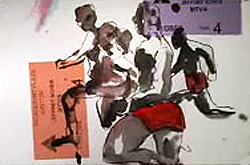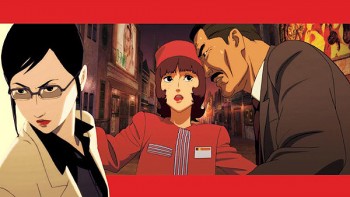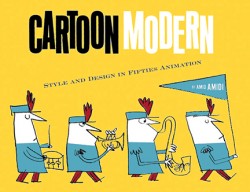Commentary &Daily post 01 Jun 2007 08:06 am
Scher with Paprika
- Today, in New York, Amid Amidi will receive the Theatre Library Association Award for his book, Cartoon Modern.
Congratulations to him for the well deserved award.
John Canemaker will be presenting the award. I’ll be there to watch (and give some notes tomorrow.)
- Last year the NY Times featured monthly reports by artist/illustrator Maira Kalman.
I waited monthly for those visual diaries. The art was stunning. But she left off doing it several months back.
 Now, the NY Times has started an animated series on its website done by animator/artist, Jeff Scher. His first piece went up on the Times and is called The Animated Life:L’Eau Life. The piece is one of Jeff’s best works, beautifully scored by Shay Lynch. (note that it loads slowly.)
Now, the NY Times has started an animated series on its website done by animator/artist, Jeff Scher. His first piece went up on the Times and is called The Animated Life:L’Eau Life. The piece is one of Jeff’s best works, beautifully scored by Shay Lynch. (note that it loads slowly.)
Unfortunately, you might have to be a subscriber of the TimesSelect to see the work.
However, I suggest you get in touch with someone you know who subscribes to the TimesSelect to see it.
 – Let me tell you about Paprika. A small group of us went last Saturday to see the film. The trailer seemed interesting and the reviews were over the top, so I was hell bent on checking it out. I’d also enjoyed Tokyo Godfather and Millenium Actress by the same director, Satoshi Kon.
– Let me tell you about Paprika. A small group of us went last Saturday to see the film. The trailer seemed interesting and the reviews were over the top, so I was hell bent on checking it out. I’d also enjoyed Tokyo Godfather and Millenium Actress by the same director, Satoshi Kon.
Paprika more resembles Millenium Actress than any other. It’s a head trip of a film that intermixes the internet with movies with dreams. I’m sorry to say, I also didn’t think it worked very well.
Right at the start of the film, we’re ushered into a dream – this is the first and only time the same, repeating dream has a beginning. The dream is interrupted as we learn that a red-headed nymph of a character, Paprika, is sharing dreams with a hard-boiled detective who is trying to solve a murder mystery. His time is up, and Paprika runs off to the lab where she turns into a scientist, Chiba. The doppelganger Chiba cum Paprika doesn’t work at all, since we don’t really know who or why one is the other.
 The dream machine is stolen by someone within the company – we’re never quite sure why though somehow he’ll control the world with it – and the remainder of the film is 90% dream repetition. You remain engrossed spending two hours trying to unravel the story, but in the end you’re not quite sure who is what and where you are or why?
The dream machine is stolen by someone within the company – we’re never quite sure why though somehow he’ll control the world with it – and the remainder of the film is 90% dream repetition. You remain engrossed spending two hours trying to unravel the story, but in the end you’re not quite sure who is what and where you are or why?
The film definitely needed less dream and more reality. I would have liked to have known more about the real characters and why they’re so intently pursuing this dream machine. I’m not sure I understand the value of sharing my dreams with anyone. (Copyright infringement?)
Not my kind of movie. Though, I have to say, it works only on an adult level (note I didn’t say adolescent), and that’s something that probably can’t be said about any other animated feature yet screened this year. (Only Persepolis holds out hope for adding to that roster.)
Ultimately, I can say that if you’re an Anime buff, go see Paprika; if you’re not go see The Golden Door, an excellent and beautiful French/Italian film about immigrants coming to America at the turn of the 20th Century.


on 01 Jun 2007 at 3:19 pm 1.Benjamin De Schrijver said …
I loved Paprika.
**spoilers ahead**
To me, unlike many, the logic did work. One main aspect of it being that aside from the security aspect, the device WAS complete, unlike she says in the beginning. It was already able to enter dreams when the patient’s awake. But due to the lack of security, the dreams started to blend/merge, and then when it started to invade the people that were awake, reality and dream got mixed up in one big delusion.
The use of sharing dreams (for the company, not the inventor) is psychology and therapy. The danger of course being that if someone else can enter and thus alter your dream, they are altering your subconscious mind.
Paprika is part of the subconscious of closed up, stiff Chiba, part of her own dreamworld, and by using that identity so much, she started to “invade” her reality too. This is perfectly in line with what to me was the theme of the film (and which was even litterally put in the dialogue between Chiba and Paprika near the end): becoming true to yourself. That’s how the device can help patients – helping to figure out their own truth – and that’s what it did for the main characters. Chiba loses her stiffness and becomes more of the person Paprika is, allowing herself to love the inventor. The inventor learns about responsibility and starts to grow up. The detective finds peace with himself and his past. Though for the male collegue, becoming true to himself wasn’t so pretty. As for the little professor, he’d already found himself by being treated by Paprika for a depression 2 years earlier. So even if the natural logic wouldn’t fit, I feel the emotional logic still works, and makes it successful.
**end spoilers**
I did notice, though, that a lot of reviews went something like this: “I couldn’t follow at all, but I had a ton of fun trying and simply looking.” Which I think says a lot about how they’d also like western animation to “grow up” and start reaching for its full potential.
on 01 Jun 2007 at 10:15 pm 2.Josh said …
I think what Paprika lacked in my mind was a lack of depth to it’s characters. There wasn’t any psychological growth in any of the main characters (except for the detective) and the “love discovery” at the end felt completely tacked on. Also, Paprika was the only character who I thought interesting but her story really wasn’t told either, there was development in how she viewed herself (as a dream entity without a physical body).
The only humour came from the fact that the huge, boyish inventor look very similar to Gabe Newell.
on 01 Jun 2007 at 10:33 pm 3.Michael said …
I’m impressed, Benjamin, with how much you got out of the film. I found it too convoluted to be comprehensible, but it wasn’t for lack of trying. Only once during the film did I actually get tired of it. I still prefer the film over any of the American films I see on the horizon. Perhaps Ratatouille will be better than I expect, but I have no interest in Shrek or much else coming.
on 19 Jun 2007 at 12:23 am 4.Daniel Thomas MacInnes said …
Interesting insights by all. I got to see it tonight and thought it was a great little film. It surely had it flaws, to be sure, and I’m really, really tired with the fact that seemingly every movie has to end on a noisy action sequence (the Death Star battle all over again). But it’s an intelligent film, made by an actual film artist who’s trying to spark a discussion, instead of selling cheap merchandise.
I haven’t seen anything of Paprika before watching it, so perhaps I went in as a blank slate without expectations (beyond the name Satoshi Kon, who’s brilliant). I’m a bit surprised that so many critics were baffled by the plot; I expected convolution on the scale of The Big Sleep. Instead, it was actually pretty easy to follow. Maybe my own mind
That scene near the end, where the heroine confesses her love for the childishly geeky inventor, was my favorite moment of all. It was perfectly sublime. She rattles off her list of complaints, her reasons for avoiding him. All perfectly acceptable. And then the zinger, “But you’re so much fun.” A beautiful, sublime moment.
Upon returning home, I read in USA Today about Fantastic Four’s grosses, and realized how picky I am for complaining about Paprika’s faults. Compared to what? Dreck? Over the Hedge? Hoodwinked? Chicken Little? Robots? Ice Age? Cars? Kon’s movie isn’t perfect. But he’s so much fun.